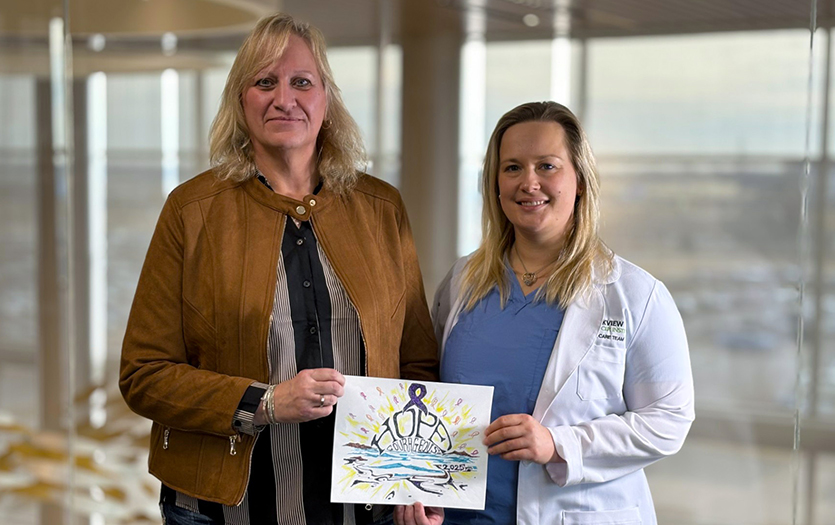
This post was written by Megan Goetz, NP-C, and Hilary Biddle, RN, BSN, OCN, Parkview Cancer Institute.
More than 80,000 women in the United States are diagnosed with gynecologic cancer every year, and more than 25,000 women will die. [1] Gynecologic cancer is any cancer that starts in a woman’s reproductive organs. The different types of gynecologic cancer include cervical, ovarian, uterine, vaginal and vulvar. While genetics can play a role in some cancers, modifiable risk factors such as a healthy diet, body mass index (BMI), smoking cessation, human papillomavirus (HPV) testing, and genetic awareness are tools individuals can use to manage their risk of these cancers. Let’s take a closer look at each one.
Healthy diet
There isn’t one specific food group that can prevent cancer, and abstaining from certain food groups won’t eliminate your risk. However, studies show that eating a diet based on plant foods like vegetables, whole grains, beans and fruit and following some basic guidelines can help reduce your risk for cancer and several other chronic diseases. It’s also important to understand that eating a plant-based diet doesn’t mean you can’t eat meat, fish or animal products like cheese and eggs. Instead, it means at least two-thirds of what you eat must be plants like vegetables, whole grains, beans, fruit, nuts and seeds. If you’re unsure where to start, Parkview’s Nutrition Services offers a free, one-time, one-on-one, 20-minute appointment with a registered dietitian to address your nutrition needs and answer your questions.
BMI
Obesity contributes to an increased risk of several gynecological cancers, including ovarian and endometrial. An individual’s BMI is sometimes used to determine a healthy body weight in relation to their height. However, it’s also important to remember that while BMI is a common indicator for health and wellness, it is not the only factor to consider. Let’s further examine the risks for both ovarian and endometrial cancers:
- Endometrial cancer: Overweight and obese women are 2-4 times more likely to develop endometrial cancer (cancer of the lining of the uterus), and extremely obese women are about seven times more likely to develop this type of cancer. A women’s risk of endometrial cancer increases with significant weight gain in adulthood, particularly among women who have never used menopausal hormone therapy (MHT). [2]
- Ovarian cancer: A higher BMI is also associated with a slight increase in the risk of ovarian cancer, especially in women who have never used MHT. For example, a 5% increase in BMI is associated with a 10% increase in risk for women who’ve never used MHT. [2]
Consuming a healthy diet and being physically active are both key factors in maintaining a healthy BMI. The American Heart Association recommends at least 150 minutes per week of moderate-intensity aerobic activity or 75 minutes per week of vigorous aerobic activity, or a combination of both preferably spread throughout the week. For more information or to take the first step in your wellness journey, Parkview’s Weight Management & Bariatric Surgery offers informational seminars along with meal planning, individualized movement goals and nutrition education.
Smoking Cessation
There is no safe form of tobacco use. Smoking tobacco products increases the risk of at least 14 different cancers including cervical, ovarian, vaginal and vulvar. It damages nearly every organ and organ system in your body. Smoking also contributes to the progression of cervical intraepithelial neoplasia, and both firsthand smoking and secondhand smoke have been linked to squamous cell carcinoma of the cervix in women with HPV-16 or HPV-18. [3] Remember, it’s never too late to stop using tobacco products. For more on smoking cessation, speak with your primary care provider for possible options and available support groups in your area.
HPV testing and vaccination
HPV infections are the leading cause of cervical, vaginal and throat cancers. Screening recommendations for HPV can be confusing, so be sure to speak with your primary healthcare provider about getting tested. Parkview’s High Risk and Cancer Risk Reduction Clinic, along with your primary care provider, both offer the HPV vaccine, which protects against the types of HPV that most often cause these cancers.
Genetics and knowing your family history
Approximately 5-10% of all cancers are hereditary, which means you may be at an increased risk for some cancers if you have a personal or family history of cancer or certain diseases. Genetic counseling and testing at Parkview Cancer Institute are now available to see if someone carries a BRCA1 or BRCA2 mutation, which could put individuals in a high-risk category for ovarian and breast cancer. If you have a genetic mutation associated with Lynch Syndrome, a heredity condition, you could have an increased risk of various cancers, including colon, ovarian, uterine, stomach, breast, pancreatic, urinary tract and more. Fortunately, genetic testing could help detect it. Gynecologic cancer is not something anyone wants to think about, but hopefully, the suggestions we’ve shared today can help lower your risk of developing these cancers. From proper nutrition to genetic testing, Parkview can help you with any questions and concerns you may have about gynecologic cancer.
Helpful resources
Sources
[1] CDC: What is gynecologic cancer?



